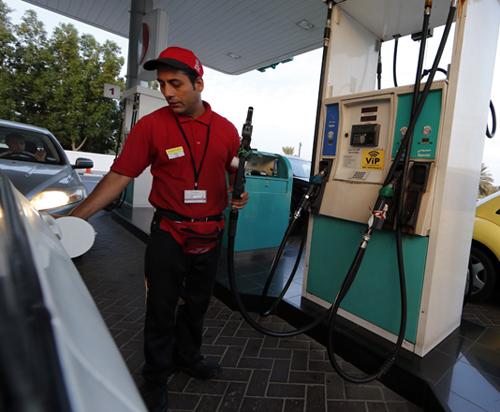You are here
Gulf Arab states risk deficit as oil price falls — IMF head
By AFP - Oct 26,2014 - Last updated at Oct 26,2014
KUWAIT CITY — Oil-dependent Gulf Arab states will face budget shortfalls if the recent decline in oil prices persists, International Monetary Fund (IMF) chief Christine Lagarde warned Saturday.
A sustained decline of $25 a barrel in the oil price would reduce the revenues of most Gulf countries by 8 per cent of gross domestic product (GDP), "and put many of them into a fiscal deficit situation", Lagarde told reporters.
But the six nations of the Gulf Cooperation Council (GCC) have built up fiscal buffers to cope with the immediate impact of the reduction in revenues, she said after a meeting with regional finance ministers and central bank chiefs.
The combined GDP of the GCC last year reached $1.64 trillion, so in this scenario the annual revenue of the six nations could plunge by roughly $130 billion.
The total revenue of the GCC states — 90 per cent of which come from oil — more than doubled from $317 billion in 2008 to $756 billion in 2012.
It declined slightly to $729 billion last year, according to IMF estimates.
The GCC groups Bahrain, Kuwait, Oman, Qatar, Saudi Arabia and the United Arab Emirates, which together pump 17 million barrels of crude oil per day and depend on oil for about 90 per cent of public revenues.
Oil prices have slumped by about 25 per cent since June because of a production glut, weaker demand and a gloomy world economic outlook.
The US benchmark West Texas Intermediate declined to about $81 a barrel on Friday on the New York Mercantile Exchange.
Lagarde called on GCC states to implement reforms and stressed the urgent need for fiscal consolidation — an appeal echoed by Kuwait's finance minister.
Anas Al Saleh urged steps to tackle rising public spending, mainly on wages and subsidies, as well as efforts to boost the role of the private sector.
"Comprehensive economic reforms, including reforming distortions in the public finances, should be enforced," he said.
Saleh stressed that the Gulf states must diversify their economies and "reduce dependence on oil".
Forecasts indicate a healthy economic growth for the six GCC nations averaging 4.5 per cent in 2014-2015, Saleh added.
"But these forecasts should be treated with caution in light of fast-paced regional and international developments, particularly the drop in oil prices which has started to impact the public finances of GCC states," the Kuwaiti minister continued.
Benefiting from high oil prices for more than a decade, the GCC states have built fiscal reserves estimated at $2.45 trillion by the International Institute of Finance.
Related Articles
A prolonged decline in oil prices will likely slow the economies of the energy-rich Gulf Arab states and impact their massive infrastructure projects, according to Standard and Poor's Ratings Services (S&P).
The International Monetary Fund (IMF) has lowered its economic growth forecasts for most Arab countries over unrest in the region but said growth would remain generally strong in the oil-rich Gulf states.
RIYADH — Saudi Arabia may reduce energy and water subsidies for wealthy citizens among other reforms to diversify its economy away from oil












